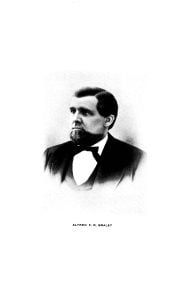Alfred Franklin Rice Braley, a respected pioneer of Saginaw City, Michigan, was born in New York in 1828 into a family of farmers. He pursued education in the classics and law, opening a practice in New York before health issues led him to Ohio. Braley returned to New York during an illness but eventually settled in Saginaw City in 1862, where he became a successful businessman in salt manufacturing, banking, and civic affairs. Known for his honesty and integrity, Braley contributed to raising Civil War volunteers despite not enlisting, served as mayor, and improved municipal conditions. He died in 1880, leaving behind a wife and daughter.

Alfred Franklin Rice Braley, one of the well-known and highly respected pioneers of Saginaw City, was born at Albion, Orleans County, New York, October 20, 1828. His parents were Nathaniel Braley, who was born at Savoy, Massachusetts, December 14, 1796, and Sarah C. Wickham Braley, born at Chatham, Columbia County, New York, July 15, 1799. Like many progenitors of the pioneers of Michigan, they were of that sturdy class that tilled the soil, having settled at Albion as early as 1801. Alfred was one of a family of ten children, four of whom settled in their native town, one at Macedon, New York, two in Kansas and two in Michigan. The father lived to the venerable age of eighty-four years, until April 13, 1880, and the mother lived until June 3, 1870. Both were buried at Albion.
In his boyhood, Alfred Braley attended the district school at Rudd’s Corners, and later received an academic education at Albion, which was supplemented by a study of Greek and Latin with the local minister. He then studied law for four years in the office of Sanford E. Church and Noah Davis, in Albion, attended the Albany Law School, and was admitted to the bar in New York State in 1852. He practiced with an associate, the firm name being Braley & Glidden. Shortly after, he removed to Ohio and was admitted to the bar of that State at Toledo in 1854. There he made good progress in spite of an epidemic of cholera which raged in that section, but failing health compelled him to seek a warmer climate. After spending several months in Louisiana he returned to his old home, and was made justice of the peace at Albion where he was held in high esteem.
One of the opportunities of his active life which gave him most satisfaction came in 1861, when, on the outbreak of the Civil War, he was personally instrumental in raising the first company of volunteers from his county. Being unable to enlist himself, he paid for two substitutes and made a journey to the battlefield of Bull Run to take help and comfort to the company.
In 1862 Mr. Braley came to Saginaw City and engaged in salt manufacturing with Daniel L. C. Eaton; and was also interested in the boot and shoe business under the firm name of Eaton, Smith & Company. In 1866, in association with Harry Miller, he opened the banking office of Miller, Braley & Company, which soon enjoyed a profitable business. So successful and solid was this institution that, as the city grew and the need for broader banking facilities became apparent, it was merged into the First National Bank of Saginaw, with Ammi W. Wright as president. Mr. Braley assumed the office of cashier of this bank, which position he held until the time of his death, August 6, 1880. For a time he was also interested in lumbering with the late Isaac Parsons and others.
As a businessman and honorable citizen, Mr. Braley had few equals and no superiors. Active, sagacious, upright, and generous, he gained a position in commercial and municipal affairs worthy of emulation. Politically he was a Democrat of the best and noblest type, sincere and true to his convictions, and carried into public life the uprightness and honor that were dominant traits of his character. “Coming here when the tide of prosperity had just fairly set in this direction and bringing an experience in municipal matters that few of the earlier residents possessed, he had much to do with the building up of Saginaw and establishing her finances upon that solid basis which has ever been a pride and satisfaction to the people of this city he loved so well.”— Obituary, Detroit Free Press, August 1880.
Public office he never sought, yet was twice elected recorder, in 1863 and 1865, and was elected mayor of Saginaw City in 1867-68-69. The duties of these offices he discharged with a degree of honesty and unselfishness characteristic of his life, and injected into public affairs a certain kind of municipal honesty which prevailed for years after. During his mayoralty he organized the police force of Saginaw City, and appointed Charles L. Benjamin the first chief of the department. Together they worked for the betterment of social conditions, especially the closing of saloons on Sunday, and the maintenance of law and order. Mr. Braley also negotiated and purchased for the city, in 1868, the fine tract of land for Oakwood Cemetery.
For many years he attended the Presbyterian Church to which he gave his aid and support; and he was a member of the Masonic fraternity, although not actively connected with its work. He was a liberal, public-spirited citizen, generous, but unostentatious in his charities, possessing a keen instinctive knowledge of humanity, a never-failing sense of humor, and was a square opponent and unfaltering friend.
In his home life, Mr. Braley was an ideal husband and father. He was married September 13, 1865, to Miss Jennie Anderson, daughter of Colonel Orin Anderson, who was born at Richmond, Ontario County, New York, July 8, 1833. They were blessed with two daughters, Grace, who died in 1871, and Esther, who now resides with her mother in Kalamazoo, Michigan.
